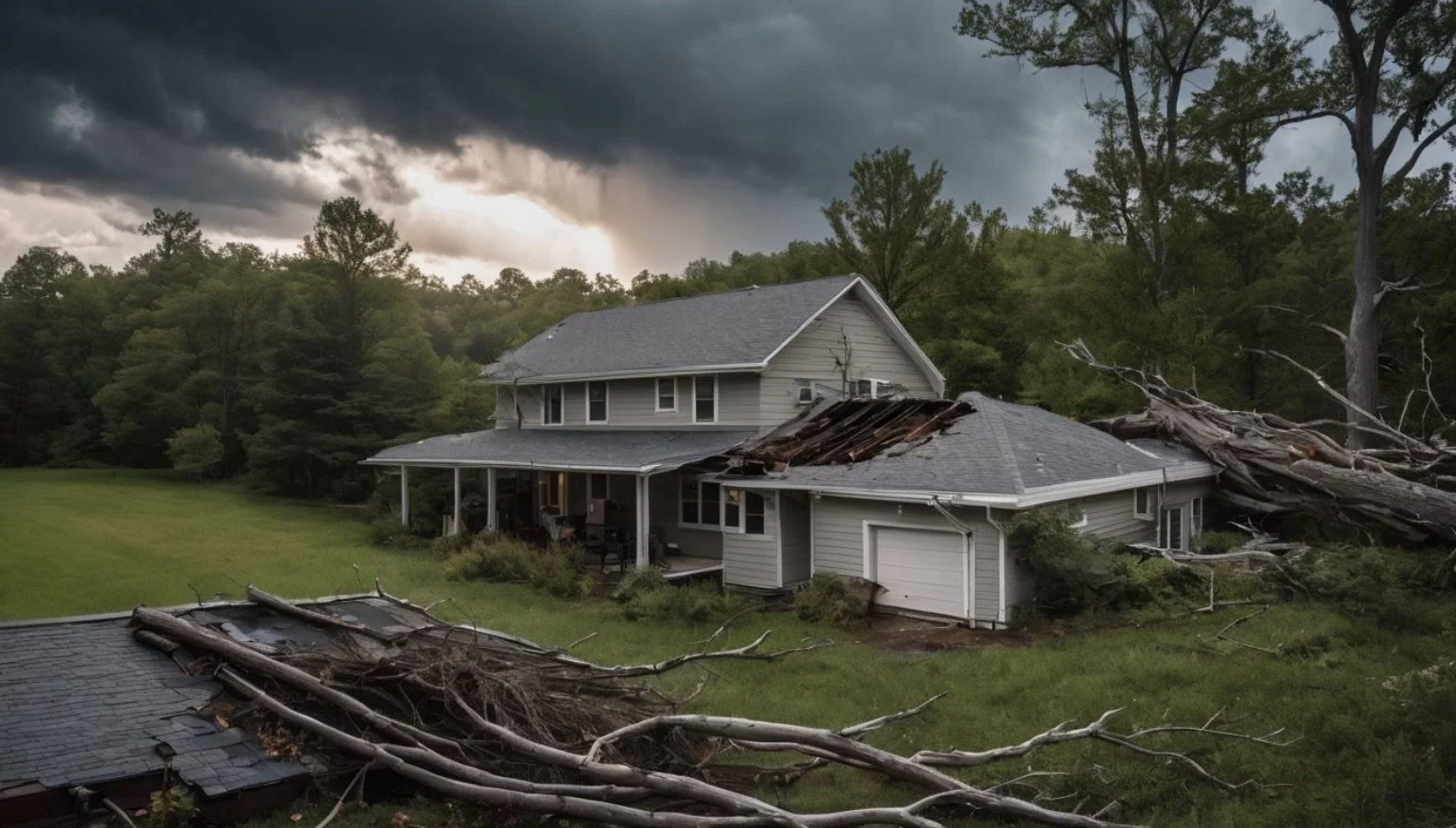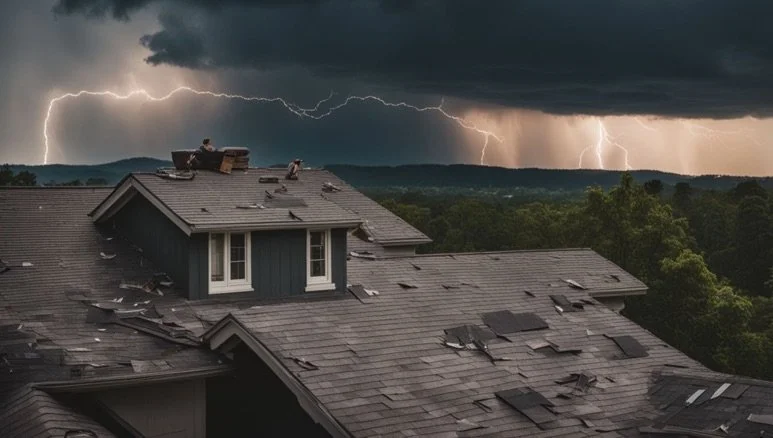how to get insurance to pay for roof replacement
Has your roof taken a real beating and you're left scratching your head, unsure if your insurance will cover the replacement costs? We completely understand how complicated wading through homeowners insurance for a roof replacement can be.That's why we've crafted this article to guide you on this journey. From discerning what damage types are covered to handling denied claims and pinpointing a trusty contractor, we've got it all wrapped up here.Ready to tackle your insurance negotiations like a pro? Let's dive in together!Key Takeaways
Insurance coverage for roof replacement varies based on the type of damage and your homeowners insurance policy.To get insurance to pay for roof replacement, make temporary repairs, review your policy, file a claim, meet with the adjuster, and receive the settlement.If your claim is denied, review the denial letter, gather additional evidence, and submit an appeal to increase your chances of approval.Choose a reputable roofing contractor experienced in handling insurance claims to ensure high-quality workmanship.
Understanding Insurance Coverage for Roof Replacement
Insurance coverage for roof replacement can vary depending on the type of damage and your specific homeowners insurance policy.What kind of roof damage is covered by insurance?
Most of the time, insurance will pay for roof damage caused by strong weather. This includes wind, hail, snow and storms that move trees onto your roof. They also cover problems like leaks caused by these events.But to get a new roof from your insurer, the harm must be very bad. Plus, how old your roof is can change whether they will give you money for repairs or replacement. It's very important to look at all parts of your policy to understand what it does and doesn't pay for.Also, take photos of any harm you see on your roof from different sides and keep all documents related to it safe. Doing this helps when talking with insurance companies about paying for fixes.Does homeowners insurance cover roof replacement?
Yes, homeowners insurance can cover roof replacement. Yet, this is true only under certain conditions. Your policy will pay for a new roof if the old one gets damaged by an event or mishap it covers.These events often include storm damage caused by wind, hail storms, snowstorms, and tornados. Homeowners insurance may also cover roofs damaged from fallen tree limbs during strong storms.However, not all damages are covered by your policy. For example, if your roof needs to be replaced because of age or leaks that you could have prevented with regular maintenance work on the roof over time then you might need to pay out of pocket for the new roof costs.Remember this! Do not sign any papers until your claim gets approved by insurance inspection people who come and see your house's damaged part themselves.Steps to Get Insurance to Pay for Roof Replacement
To get insurance to pay for roof replacement, you need to make temporary repairs and get an estimate, review your insurance policy, file a roof insurance claim, meet with the insurance adjuster, and finally receive the settlement and fix your roof.Make temporary repairs and get an estimate
First, we fix up the roof as best we can. This keeps your home safe until the big roof repair happens. We keep a list of all work done and what it costs. Then, we figure out how much the full roof job will cost.Giving this number to your insurance company helps them know how much they should pay for the damage.Review your insurance policy
Let's take a good look at our insurance policy. It tells us what kind of roof damage is covered. We need to know if it covers things like hail storms, snowstorms, or tornados. If a tree limb falls on the roof during a storm, we must find out if that is covered too.Each policy is different so understanding ours will help us in case we need to file an insurance claim for roof replacement.File a roof insurance claim
To file a roof insurance claim, start by calling your insurance company and providing them with details about the damage. They will guide you through the process and may ask for documentation such as photos or videos of the damage.An adjuster will then be assigned to inspect your roof and assess the extent of the damage. After their assessment, you can submit a claim for approval. It's important to find a reputable roofing contractor who has experience working with roof damage insurance claims.If your claim is initially denied or only partially approved, you can supplement it with additional information or get an independent estimate from another contractor. Overall, stay in communication with your insurance company throughout the process to ensure a smooth resolution.Meet with the insurance adjuster
Meeting with the insurance adjuster is an important step in getting your insurance to pay for a roof replacement. During this meeting, the adjuster will inspect the damage to your roof and determine if it qualifies for a full replacement covered by insurance.It's crucial that you wait for the adjuster's approval before signing any contracts with roofing contractors. Remember, only the insurance adjuster has the authority to approve your insurance claim, regardless of what the contractor may say.To ensure compliance with your insurance company and avoid potential fraud, it's recommended to choose a roofing contractor who has experience handling insurance claims.Get the settlement and fix your roof
To get the settlement and fix your roof, there are a few important steps you need to follow. First, make sure you have temporary repairs done to prevent further damage. Then, get an estimate for the cost of roof replacement from a reputable roofing contractor.Next, review your insurance policy to understand what is covered and what is not. After that, file a roof insurance claim with your insurance company by providing all necessary documents and information.Once you've filed the claim, an insurance adjuster will come out to inspect the damage and determine the amount of the settlement. Finally, once you receive the settlement from your insurance company, use it to fix your roof by hiring a reliable roofing contractor who can provide high-quality workmanship.Dealing with Denied Claims
If your insurance adjuster denies your roof claim, there are steps you can take to resolve the issue and negotiate for a full roof replacement with your insurance company.What to do when the insurance adjuster denies your roof claim
If your insurance adjuster denies your roof claim, don't panic. There are steps you can take to potentially overturn the decision. First, review the denial letter and understand why your claim was denied.It could be a simple misunderstanding or lack of sufficient evidence. Next, gather additional documentation and evidence to support your claim. This may include photos, repair estimates from reputable contractors, and any relevant policy language that supports your case.Once you have gathered all necessary information, submit an appeal letter to your insurance company outlining why you believe the denial was incorrect. If necessary, consider hiring a public adjuster or seeking legal advice to help with the appeals process.Remember, persistence and providing clear evidence will increase your chances of getting the insurance company to reconsider their decision.How to negotiate a full roof replacement with insurance
To negotiate a full roof replacement with insurance, it is important to have evidence of significant damage caused by extreme weather conditions covered by your policy. This can include photos, videos, and documentation from roofing professionals.When meeting with the insurance adjuster, be prepared to present this evidence and emphasize the safety concerns associated with a damaged roof. If the claim is initially denied or only approved for partial repairs, it may be necessary to work with a public adjuster or seek legal advice to advocate for a full roof replacement.Remember to stay persistent and provide any additional information requested by your insurance company throughout the negotiation process.Choosing the Right Contractor for Roof Replacement
Find a roofing contractor with experience working on roof damage insurance claims. Look for reputable companies in your area that have a good track record and are compliant with insurance company requirements.Avoid storm chasers or contractors offering suspiciously low prices, as they may be involved in insurance fraud.Find a roofing contractor who has experience working with roof damage insurance claims
When looking for a roofing contractor to help with your roof damage insurance claim, it is important to find someone who has experience dealing with these types of claims. This ensures that they understand the process and can navigate any potential challenges that may arise.A contractor with this experience will also be more likely to comply with the requirements set forth by your insurance company, which can help streamline the approval and payment process.Additionally, working with an experienced contractor reduces the risk of falling victim to potential scams or fraudulent practices. So before hiring a roofing contractor, make sure they have a proven track record of successfully handling roof damage insurance claims.Avoiding roof repair scams
To avoid falling victim to roof repair scams, it's essential to be cautious and do your research. Be wary of storm chasers or out-of-state companies that offer low prices and promise fast repairs.These companies may not have proper licensing or experience, and their workmanship could be subpar. It's important to hire a reputable local roofing contractor with experience in handling insurance claims.Before signing any contracts, make sure your insurance claim is approved by the adjuster. This will help ensure compliance with your insurance company and protect you from potential fraud.Conclusion
In conclusion, getting insurance to pay for roof replacement requires following a step-by-step process. Start by making temporary repairs and getting an estimate. Review your insurance policy to understand what is covered and file a claim.Meet with the insurance adjuster and if approved, get the settlement and fix your roof. In case of denied claims, learn how to negotiate with your insurance company. Lastly, choose a reputable roofing contractor experienced in handling insurance claims.By following these steps, you can increase the chances of getting your roof replacement costs covered by insurance.FAQs
1. How does the insurance claim process work for a leaking roof?
The first step in the insurance claim process is to submit all repair documents, including your contractor receipt and damage estimate, using your policy number. The insurance company will then carry out an inspection process before giving approval.2. Can storm damage like straight-line winds and hail damage be covered by homeowner's insurance?
Yes, most homeowner's insurances cover storm damaged roofs caused by wind, hail or falling trees on the roof but not flood or earthquake unless you have extra coverage.3. What roofing costs are involved when my roof is damaged from trees?
The total roofing cost can vary based on factors like roof material used and extent of tree falls or weather damage caused to your property.4. Does working with a local roofing company help me during the supplementing insurance claims?
Yes, hiring a reputable local roofing firm in Nashville or Middle Tennessee can support you during the supplementing claims process as they understand compliance needs with many homeowners' insurance companies.5.How do I deal with unexpected accidents such as leaks that occur after replacing my roof?
After obtaining an emergency service from your local company in case of unexpected accidents like leaks, remember to keep every repair document which could be useful if there's need for another round of claim submission later.6.What should I pay attention to when negotiating a full roof replacement with Insurance?
Check whether their estimates cover everything needed and compare them with those provided by contractors so low insurance estimates won't affect satisfying results you require.



